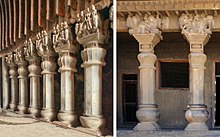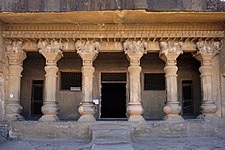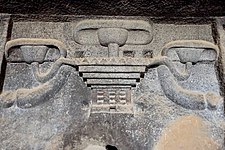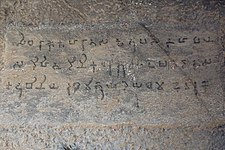|
Ushavadata
Ushavadata (Brahmi: U-ṣa-va-dā-ta, Uṣavadāta), also known as Rishabhadatta, was a viceroy and son-in-law of the Western Kshatrapa ruler Nahapana, who ruled in western India. NameUshavadata's name is attested in his inscriptions as Uṣavadāta, which is derived from the Saka name *R̥śvadāta, meaning "rightly created".[3] Inscriptions Much of the information about Ushavadata comes from his Nashik and Karle inscriptions. The Nashik inscription contains an eulogy of Ushavadata in Sanskrit, and then records the donation of a cave to Buddhists in a Middle Indo-Aryan language. The Karle inscription contains a similar eulogy, but in the Middle Indo-Aryan language.[4] Early lifeUshavadata was the son of one Dinika.[5] He identifies as a Shaka (IAST: Śaka) in his Nashik inscription:
He believed in Brahmanism,[7] and married Nahapana's daughter Dakshamitra. CharityBoth of Ushavadata's inscriptions mention the following of his charitable acts:[5]
The Nashik inscription records more such acts, stating that Ushavadata exhibited very pious behaviour at the Trirashmi hills, where the Nashik caves are located:[8]
Military careerUshavadatta campaigned in the north under the orders of Nahapana to rescue the Uttamabhadras, who had been attacked by the Malayas (identified with the Malavas).[10] He also extended the realm by defeating other enemies.[11] The Satavahana king Gautamiputra Satakarni appears to have defeated Rishabhadatta. An inscription discovered in Nashik, dated to the 18th year of Gautamiputra's reign, states that he donated a piece of land to Buddhist monks; this land was earlier in the possession of Ushavadata.[12] See alsoReferences
Bibliography
|
|||||||||||||||||||||||





